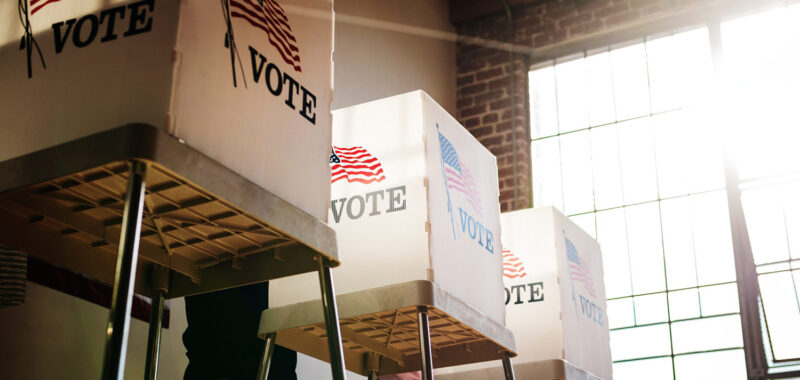With another presidential election at America’s doorstep, Lawrence D. Bobo, the dean of Social Science, last week gathered four of his division’s faculty members — Mina Cikara, Jill Lepore, Eric Nelson, and Theda Skocpol — to discuss the state of the U.S. political system.
“We don’t have enough occasions in the social sciences to share ideas across our disciplines, across our methods, and across our different perspectives to understand key issues,” offered Bobo, who is also the W. E. B. Du Bois Professor of the Social Sciences, at the top of the conversation. He hoped that the interdisciplinary panel’s expertise — in history, sociology, government, and political theory and psychology — would yield “a sense of illumination, if not calm, about the fate of American democracy.”
Drawing on field research with American voters and the history of U.S. political thought, the symposium quickly surfaced disagreement over the source of recent dysfunction.
Borrowing from a lecture she delivered last month upon winning the American Political Science Association’s James Madison Award, Skocpol, the Victor S. Thomas Professor of Government and Sociology, shared with the panel a timeline of recent actions by the Republican Party that in her view are aimed at undercutting U.S. elections and accountable governance.
“We’re in a period of radicalization to the point of authoritarian, anti-democratic commitment by one of the two major political parties,” she said. “Ironically, it’s the party that started out in the Civil War-era celebrating freedom and opposing slavery.”
Skocpol, co-author of “The Tea Party and the Remaking of Republican Conservatism” (2012) and “Rust Belt Union Blues” (2023), distributed a handout listing 18 examples since 2000 of what she termed “legal hardball,” a concept she credited to her Government Department colleagues Steven Levitsky and Daniel Ziblatt, whose book “Tyranny of the Minority” (2023) details how Southern Democrats used “constitutional hardball” during Reconstruction to disenfranchise Black voters and secure their own power.
Nelson, Robert M. Beren Professor of Government, offered “a modest dissent, or at least a friendly amendment” to Skocpol’s account. “There’s no question that the Republican Party has become deeply radicalized,” said Nelson, author “The Theology of Liberalism: Political Philosophy and the Justice of God.” (2019). “But I think the phenomenon that we’ve seen is a spiral, and in order to diagnose it correctly you have to realize that the dynamics require a kind of tit-for-tat on both sides.”
Democrats were the first to break with norms around judicial appointments, he argued, with Democratic senators lining up in 1987 against President Ronald Reagan’s Supreme Court nominee Robert Bork. “Republicans then responded and began abusing the confirmation process, particularly for lower court federal judges,” he said.
Democrats, he said, then eliminated the filibuster for lower court appointments in 2013. Republicans, in turn, refused to give President Barack Obama’s nominee Merrick Garland a SCOTUS hearing in 2016 and eliminated the filibuster for nominations the following year.
As a result, presidents no longer nominate justices who are “at least minimally acceptable to those in the minority,” Nelson said. Democrats have become increasingly outraged by the succession of Supreme Court decisions that followed. “And the Democrats now propose to violate the Constitution by having Congress pass a bill that pretends to have the authority to impose term limits on justices,” he concluded.
Also documented by Skocpol is an uptick in what she called “extralegal” threats and violence following false claims about the 2020 election results. Her examples included harassment of public officials as well as the Jan. 6 riot at the Capitol.
Republicans controlled the presidency and Congress for much of the period she analyzed, Skocpol said. “I think the timeline here raises the possibility that an outright offensive authoritarian movement has emerged that wants to take it all and to turn elections into, at most, decorations — and to deploy harassment and threats of violence regularly along with quasi-legal tactics,” she said.
Insights from the event’s other two speakers looked beyond partisan politics. Lepore, David Woods Kemper ’41 Professor of American History, drew from her 2020 book “If Then” to review six decades of technological change and what she sees as its corrosive effect on all levels of government. Cikara, a professor of psychology who specializes in intergroup conflict and polarization, spoke to a hopeful body of research on altering people’s “meta-perceptions,” or an individual’s ideas about how others regard them and their identity group.
With both Harvard students and faculty in attendance, the Oct. 21 symposium featured a lively Q&A section, dominated by fears of constitutional crises and democratic collapse.
Nelson shared his concerns that this year’s election results could set off “terrifying sorts of constitutional impasse” and “dangerous levels of instability and dysfunction.” Nevertheless, he lamented all the talk of existential danger this election season. “It reminds people of things that were said in 2016 and 2020,” he said.
It has become the “standard get-out-the-vote rhetoric” on left and the right alike, Lepore added. “I think there’s a lot of really important work about the stakes, and the stakes are extremely high, but I think that rhetoric is fundamentally incendiary.”
“But why would it be rhetoric to identify those threats and try to communicate them?” Skocpol wondered.
“The argument is that it has a perverse effect,” Nelson replied. “At this point, there’s been so much of it that people tune it out and don’t take the actual threat sufficiently seriously.”
Source link

